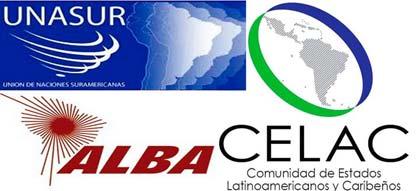The future of Latin American integration processes in dispute
United or dominated: this is the dilemma faced by the peoples and countries of the region, in a global geopolitical framework of great complexity.
- Análisis

The integration processes of Latin America and the Caribbean, that over the past fifteen years made a qualitative leap with the establishment of the Bolivarian Alternative for the Americas (ALBA), the Unión of South American Nations (UNASUR) and the Community of Latin American and Caribbean States (CELAC), have reached a crossroads. In 2018, they face defining their destiny, in the midst of a dispute that confronts them with a historical dilemma, in a global geopolitical framework of great complexity: will the peoples and countries of the region be united or dominated?
The capitalist crisis and decadence in the traditional central European metropolises, together with the emergence of new economic, military and political Asian and Eurasian powers, and the processes of national–popular anti-imperialist emancipation and liberation in Latin American and the Arab region, marked the first tendencies of the new century. Nevertheless, political fluctuations in several countries of significant regional importance and the recuperation of the imperialist strategy over their claimed “back yard”, in recent years, mean that the advances obtained are teetering.
Never before in history was the coordination of the countries of the region so strong, particularly due to the leading presence of Brazil with Lula da Silva, who became the axis of unity, especially due to his strong economic weight and world influence, and the leadership of Comandante Hugo Chávez, who brought up-to-date and further developed the Bolivarian ideal of the Great Fatherland, together with the commitment of various Caribbean and Latin American governments.
Even the Mexican government, prone to supporting US policies, had to join the CELAC project in order to defend the region as a zone of peace and development. And the US government itself had to accept, in the Summit of the Americas, the presence and the participation of the Cuban president as an important step towards the resumption of diplomatic relations.
In the past three years, neoliberal and conservative strategy has managed to produce targeted impacts on the nationalist and anti-imperialist processes, with the Coup d’État against the government of Dilma Rousseff in Brazil and with the electoral victory of Mauricio Macri, now repudiated by the Argentine people. This was the moment in which imperialism accelerated its economic, financial, media, diplomatic military and political siege against the Venezuelan government of Nicolas Maduro and the projects of national unity and liberation.
In the present situation, the tensions have rapidly accelerated and the areas of struggle have been defined. The main political contradiction and the concentration of forces are centered around: firstly, the threat of a military invasion of Venezuela by the United States and Colombia, with the visit from Washington of Secretary of State, Rex Tillerson, to various conservative presidents of the region; and secondly, the cancelation as presidential candidate of the powerful leadership of Lula da Silva, the great popular pacesetter, who has every possibility of winning the elections in Brazil in October and recuperating the Latin American and anti-imperialist initiatives. Nevertheless persecution by the powerful media, the justice system and the traditional political parties, is moving to prevent his candidature.
If this should occur, as now appears imminent, the possibility of having a single candidate of the national-popular field, backed by Lula, could still signify an alternative to the conservative candidates, with the possibility of changing the political course of Brazil and Latin America, even though it is not the same as the figure of the metallurgical worker (Lula).
On the other hand, the Mexican elections are taking on a special hue, with the foreseeable victory of Andrés López Obrador of the Movement of National Regeneration (MORENA), a candidate from outside the established order of the Revolutionary National Party (PRI) and the National Action Party (PAN), who faces the candidates of the colonial order. If this is confirmed in June, it will open up possibilities for counting on a very important country, open to emancipating and integration projects.
This is an hour of great and decisive definitions for Latin America, at a moment when the Summit of the Americas will meet in Lima under the baton of Trump and his admirer, Peruvian President Kuczynski, who is seeking to exclude the presence of President Nicolas Maduro; and when Pope Francis has pronounced the need for the unity of the Great Fatherland. Latin America and the Caribbean are facing the situation of either continuing to be a collection of colonies or semi-colonies of imperialism, or of becoming key actors in the global politics of the XXI century.
16/02/2018
(Translated for ALAI by Jordan Bishop)
Eduardo Paz Rada is a Bolivian sociologist and professor at UMSA. He writes for publications of Bolivia and Latin America.
Del mismo autor
- América Latina y la guerra en Ucrania 14/03/2022
- Industrialización y sustitución de importaciones 01/03/2022
- Bolivia: soberanía en la política internacional 03/01/2022
- A un año de la recuperación democrática en Bolivia 08/11/2021
- Rómulo Calvo: jefe de la oposición en Bolivia 27/10/2021
- El poderoso Brasil en una encrucijada histórica 12/10/2021
- Arce contra el intervencionismo de la OEA 30/09/2021
- Bolivia: la campaña del periódico Página Siete contra Evo y el proceso nacional-popular 01/09/2021
- Recuperar la estrategia geopolítica latinoamericana 13/08/2021
- La guerra mediática contra el gobierno boliviano 21/07/2021
Clasificado en
Clasificado en:
Integración
- Facundo Escobar 14/01/2022
- Eduardo Paz Rada 03/01/2022
- Francisco Eduardo de Oliveira Cunha 03/01/2022
- Adalid Contreras Baspineiro 13/10/2021
- Juan J. Paz-y-Miño Cepeda 21/09/2021








